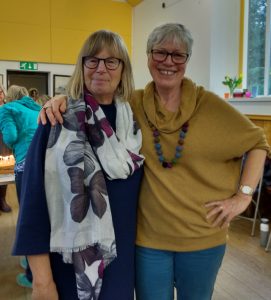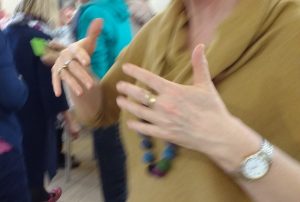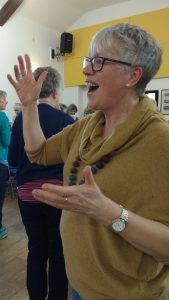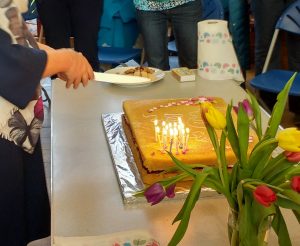 When I was 6 or 7, my Dad returned from a trip to Germany bringing me the most wondrous packet of felt pens I’d ever seen. They were double-ended, with a fat end for colouring large areas and a pointy end for detail. Forget previously-desirable Platignum and Pentel: in early-70s Aberdeen, this was serious Blue Petering kit. This was love.
When I was 6 or 7, my Dad returned from a trip to Germany bringing me the most wondrous packet of felt pens I’d ever seen. They were double-ended, with a fat end for colouring large areas and a pointy end for detail. Forget previously-desirable Platignum and Pentel: in early-70s Aberdeen, this was serious Blue Petering kit. This was love.
Soon after, I announced that I wanted to be an opera singer when I grew up. Opera singers came from Germany (of course), so this would be the way to secure my future supply of this fantastic kit. (I did love singing, too, so it all made sense.)
Things went pretty well till I went to boarding school, where sustained bullying by a music teacher led me to abandon all but the mandatory music activities. Mr Reed—name not changed for confidentiality purposes—used to thrown hymn books at choir members when they made a mistake, and made me sing alto because I could hold the line (so I didn’t discover I was a natural high soprano till I was about 25). In one of his rages he told me I’d grow up to be a trade union leader or the editor of Spare Rib. This meant nothing to me at the time, but I could feel it was intended as hurtful, shaming criticism. It worked. Throw in a few confidence-crushing Cambridge Music Society auditions against those who’d been choral-scholar trained since the cradle, and I stopped singing. No university music (or felt pens) for me.
 These days, as you know, I’ve reclaimed singing; but it still has over it that shadow of ‘the door I never opened’—a might-have-been, a wondering, about singing for a living. And this feeds into the pressures I can put on myself about singing well, about being noticed, and making the most of what I’ve been given. So when my friend Suan threw a most unusual 70th birthday party for herself—she invited a load of us to come and take part in a singing-by-ear workshop day facilitated by Faith Watson of Singing for Larks—it was going to challenge me in all sorts of ways. Could I put aside that longing for perfection, and the desire to be approvingly “seen” as the singer I really was? How would it be to sing without the security of a score to hold, the reassurance of the black dots on the page?
These days, as you know, I’ve reclaimed singing; but it still has over it that shadow of ‘the door I never opened’—a might-have-been, a wondering, about singing for a living. And this feeds into the pressures I can put on myself about singing well, about being noticed, and making the most of what I’ve been given. So when my friend Suan threw a most unusual 70th birthday party for herself—she invited a load of us to come and take part in a singing-by-ear workshop day facilitated by Faith Watson of Singing for Larks—it was going to challenge me in all sorts of ways. Could I put aside that longing for perfection, and the desire to be approvingly “seen” as the singer I really was? How would it be to sing without the security of a score to hold, the reassurance of the black dots on the page?
For a short time I’d been a member of the local Threshold Choir. Threshold Singers learn by ear a repertoire of simple but astonishingly powerful songs, which are sung to the ill and dying (you can listen to one of their songs here; and do stick around for the harmonies. Worth the wait). I loved being part of this extraordinary movement, but rehearsal clashes and that pesky earning-a-living thing meant I had to withdraw. Besides, I could remember that that several of my less lovely dwarves—principally Grumpy, Impatient and Arse-y—got involved: whatever my intellectual approval of the inclusiveness of singing by ear, it did challenge my Perfection Head. So, what with one thing and another, I was quite apprehensive about “showing myself up” in some way at Suan’s do.
Hence I pitched up at the village hall with a large bowl of quinoa salad (from the Essence of Middle Class cookbook) and a fair-sized helping of nerves, too. A group of about 50 people was gathering in the large, airy room, at one end of which a quietly bustling sub-group was taking charge of people’s food offerings and organising the drinks. At around ten Suan called us to order (by the splendid Quaker method of raising one hand and waiting), deftly organised volunteers for the rest of the day’s housekeeping tasks, and introduced us to Faith.
 Faith got us started with a simple, one-line song, the lyrics of which—‘May this room be filled with joy and harmony’—felt absolutely right for the occasion. I think there were three parts to learn, and she taught them, as she taught everything else, by singing them through a couple of times, then inviting us to join in—not worrying about the lyrics, or about remembering it all, but simply doing what we could. As she sang, and when we joined in, she used her hands to indicate the rise, fall and relative pitch of each notes. Her hands were extremely expressive: easy to follow, clearly-spoken (as it were) and simply beautiful to watch because of that dexterity. This wasn’t like standard conducting, though there were times, in the more complicated songs, where she was bringing us in as a “normal” conductor would. Instead, this was more like old-fashioned hand signing for sol-fa, except that there was no stress of trying to remember which sign meant which pitch. There was a fluency and clarity which meant that I felt totally safe in her hands (forgive the pun). And that feeling of safety transformed my experience of the day as a whole.
Faith got us started with a simple, one-line song, the lyrics of which—‘May this room be filled with joy and harmony’—felt absolutely right for the occasion. I think there were three parts to learn, and she taught them, as she taught everything else, by singing them through a couple of times, then inviting us to join in—not worrying about the lyrics, or about remembering it all, but simply doing what we could. As she sang, and when we joined in, she used her hands to indicate the rise, fall and relative pitch of each notes. Her hands were extremely expressive: easy to follow, clearly-spoken (as it were) and simply beautiful to watch because of that dexterity. This wasn’t like standard conducting, though there were times, in the more complicated songs, where she was bringing us in as a “normal” conductor would. Instead, this was more like old-fashioned hand signing for sol-fa, except that there was no stress of trying to remember which sign meant which pitch. There was a fluency and clarity which meant that I felt totally safe in her hands (forgive the pun). And that feeling of safety transformed my experience of the day as a whole.
Once we’d learned the different parts—you could choose which you did—we sang it while standing in our wobbly, village-hall-shaped circle, then again as we moved around the room, slowly weaving between each other, so that you heard different sound mixes with each step, and got to look at—and into—the faces of your fellow singers, all immersed in the song. It was a direct route to joyful tears for me: such a sense of co-operation and connection, of merger. Music magic: and all before we’d even done the warm up.
It was a novel warm up, too, involving singing like Garbo (in the chest), John Major (throat), Kenneth Williams (nose and cheeks) and then ‘from the top of your head’ in turn. Such a simple and clever way of getting you to experience the various restrictions and resonances of “feeling” and producing the voice in different places. Once we were warmed up, we powered through a (to me) surprising amount of music—a range of pieces from ‘Lovely Day’ to ‘Samba du Brasil’ via ‘I can’t give you anything but love, baby’ and a Glenn Miller type number. Throughout, there was reassurance and encouragement: inclusiveness was the warp around which the weft of our singing was woven. I became aware, during ‘Lovely Day’, that someone a few seats to my right was singing the part accurately, but a third down. It snagged for a moment in me, and then I felt myself let it go, realising it simply didn’t matter: that this was the whole point. We were all part of it, meeting and merging as equals.
 Faith’s energy levels, sustained throughout the day, were extraordinary: this was a woman who, sitting singing a samba song, could start a party simply by the joy and energy with which her hands tapped out the rhythm on her legs. I also loved it when she was moving from one part to another and would do a sort of vocal speed-sing through the line she was switching to, in order to find the note she needed to give us. It reminded me of that noise you used to get when you pressed “fast-forward” on a cassette while “play” was still going—a sort of sung gabble which dropped back down into coherence when it got to the relevant point. And how she found her way to support all four parts, apparently simultaneously, when we were all singing the finished songs, I just don’t know. But she did.
Faith’s energy levels, sustained throughout the day, were extraordinary: this was a woman who, sitting singing a samba song, could start a party simply by the joy and energy with which her hands tapped out the rhythm on her legs. I also loved it when she was moving from one part to another and would do a sort of vocal speed-sing through the line she was switching to, in order to find the note she needed to give us. It reminded me of that noise you used to get when you pressed “fast-forward” on a cassette while “play” was still going—a sort of sung gabble which dropped back down into coherence when it got to the relevant point. And how she found her way to support all four parts, apparently simultaneously, when we were all singing the finished songs, I just don’t know. But she did.
It was, as it always is, inspiring to be in the presence of someone so happy, fluent and immersed in what they do. It’s contagious. During each song there was a point where I realised I was moving to the music without intending to: there was something about this copy-free singing which allowed the music to be a liberatingly whole-body experience. Grumpy, Impatient and Arse-y had long since left the building, knowing they weren’t going to be needed today. My pressures and concerns disappeared as ‘the insidious mastery of song’ had its way with me.
There was so much to be enjoyed about this day: a delicious and plentiful shared lunch; a re-connection with some people I hadn’t seen for a while (after going through that ‘Where the hell do I know her from?’ process in my head); and the great joy of seeing Suan celebrate, and (I think) know herself to be celebrated, as the wonderful human being that she is. But it was that experience of merger, and getting out of my own way, that shook me so much: the room was united, not just filled, in joy and harmony. As I left, I burst into tears, like a child desolate to find that that the party is now over. To come away from such an experience of connection felt like a sort of dis-redemption, a fall from grace.
But I’ll take the pain for the sake of the grace, any day of the week. Summon me for such song, and I’ll be there. In a hearbeat.

For more on the magic of music, have a look here.
That is so inspiring. I love singing so much. What a wonderful way to celebrate.